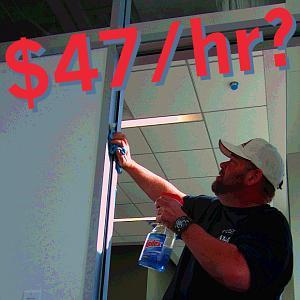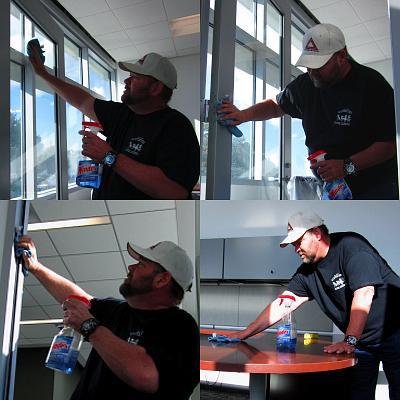ADELANTO – Though he paid his employees union-approved wages on San Bernardino County’s Adelanto Jail Expansion Project, a janitorial subcontractor was kicked off the public works site for so-called prevailing wage violations, the Bee has learned.
Six janitors employed by Baron Services had performed about nine months of scrubbing and polishing floors, cleaning windows and surfaces, and wiping down furniture and fixtures before labor compliance inspectors decided to give the final cleanup crew the boot.
According to billing invoices provided to the Bee, Baron Services worked for the general contractor, Lydig Construction, as far back as April 2012. Its last paid invoice was for August 2013, with September through November invoices marked “Not Paid.”

Jeff Baron, owner of Baron Services, demonstrates a routine cleaning task his janitorial crew performs on a public works site, which he says should be separated from the rough construction cleanup classification that warrants a $47-an-hour prevailing wage rate in Los Angeles and San Bernardino counties.
The cost to Jeff Baron, owner of Baron Services, is $65,000 in contract payments withheld from his small janitorial business, the loss of remaining work and pay for his janitorial crew at the site, while also being liable for the cost of a final cleanup replacement crew to the general contractor – and yes, at the Group 1 General Labor prevailing wage rate of $47 an hour per worker.
“The central problem is that there is no classification that applies to and is written to apply to janitorial work under the labor code that the DIR (Department of Industrial Relations) and labor compliance companies will accept on public works jobs,” Baron told the Bee. “They want to classify us under ‘rough clean up’ Group 1 General Labor, which is NOT the work that we perform.”
Kevin McCarry, Lydig Construction Senior Project Manager for the Adelanto Jail Expansion Project confirmed in an October 2013 email to Baron that his janitorial business was only responsible for final cleaning and janitorial services, not Group 1 General Labor work such as “removing from building grounds or structures any debris resultant from any construction project including but not limited to: concrete, dirt, scrap lumber, plaster, drywall, any paint or adhesive products from windows, floors, ceramic tile and bathroom fixtures … that all of this work was done before Baron Services came on site.”
As a janitorial subcontractor performing final cleanup on a public works site, Baron Services prepares the near-ready facilities to be inspected and handed over to the occupant.
This distinction has caused much heartache and harassment for janitorial subcontractors who are often nailed for not paying its workers the prevailing wages classified for Group 1 General Labor, which is rough construction cleanup performed by the Laborers Union – officially the Laborers International Union of North America.
Rather than recognize final cleanup janitorial work as its own classification under the state’s labor code, the DIR has lumped final cleanup janitorial work under the classification of Group 1 General Labor – which creates an industry-wide trap that eliminates private competition to the benefit of the Laborers Union, while also creating more business for state Labor Compliance Programs, dir.ca.gov/lcp.
However, it is taxpayers that are on the hook for paying janitorial workers $47 an hour when contractors like Baron, as a signatory to Service Employees International Union (SEIU) Local 1877, demonstrates a more sensible and fair market rate, paying his employees SEIU-approved wages from nearly $9 to $15 an hour.

Cleaning windows, frames and surface tops at the Rancho Learning Center in Arcadia, Jeff Baron demonstrates a range of janitorial duties his SEIU employees will normally perform on a public works site.
Baron told the Bee that SEIU-approved wage rates for janitorial final cleanup work depend on the region. Wages vary in Southern California: about $13.40 an hour in the Greater Los Angeles area; $11 in the outer Los Angeles areas, such as Glendale or Orange County; and $8.52 in San Bernardino County, such as Adelanto.
“I pay my employees from $15 an hour for supervisor down to $8.52 (or minimum for the area they are working),” said Baron, who has worked in the final cleanup business for 25 years. “All prevailing wages are set by the unions they represent. Our wages should be set by the SEIU, not the Laborers Union.”
According to the DIR’s prevailing wage determination for public works projects in Los Angeles and San Bernardino counties, listed at dir.ca.gov/…/SC-023-102-2, taxpayers are footing the bill for janitorial workers under the Group Labor 1 classification – which comes to $28.99 for the basic hourly rate and $47.18 for the total hourly rate for straight-time (8 hours). The rate is classified for Group 1, which includes “Laborer, General Cleanup” or even “Window Cleaner.”
Baron said when he told the labor compliance company, Labor Compliance Providers, for the Adelanto site that the DIR added “janitorial” as its own prevailing wage classification in San Francisco and surrounding counties, they told him it was not relevant to San Bernardino County.
“I provided this to them and they refused to accept it,” he said.
* * *
Donnel Johnson, owner of Johnson Maintenance Janitorial Services in San Diego, told the Bee that janitorial subcontractors are often forced to bid on a job that is below the prevailing wage of General Labor 1.
“This is the kicker: the contractor doesn’t even have the money to pay a contract of a prevailing wage job when it comes down to us,” Johnson said. “It’s not enough to pay any kind of contract at all, and you have to cut some kind of corners just to make it. It’s just totally impossible.”
Johnson, who has been running his final cleanup business for 18 years, said he has watched many cleaning companies go under because of this convenient discrepancy in the DIR prevailing wage classification.
“What they (unions) are doing is they’re going out there and hijacking all that they can get – or wherever they can steal from – especially when they can just go around and just dictate what they want to do to all these cleaning companies,” said Johnson, noting that he is struggling to keep his business afloat. “The bottom line where we get screwed is we can never move forward and make a profit from our business because the DIR just has the wages so doggone high.”
* * *
Darren Porter, who managed Diamond Construction Services from 1987 to 2004, found himself a casualty of the prevailing wage misclassification for janitorial work on public works sites.
As a former investigator for the Department of Justice, he now offers his support and insight to others in the janitorial industry to bring attention to this Group 1 Labor classification problem, which the Contractors State License Board calls D63 work.
“D63 is picking up lumber, plaster, drywall, debri on a construction job site. It doesn’t say nothing about mopping, waxing, cleaning bathrooms, etc., which falls under janitorial work,” Porter told the Bee. “So you have the Laborers Union saying, Oh no, the janitorial work belongs to us, too. And the janitorial union says, Wait, this is janitorial work – this isn’t D63 work.”
Porter said he has verified this point with the Contractors State License Board, who confirmed to him that janitorial crews – who perform final cleanup on a public works site – do not require a license.
Andrea Sisto, a senior investigator for the CSLB Classifications Deputy, also confirmed for Baron in a November 2013 email that “Janitorial work does not require a license” when asked if Baron Services needed a contractors license to perform janitorial work.
The Contractors State License Board site, cslb.ca.gov/…/D63, defines the D63 classification for Construction Clean-up Contractor as a subcontractor that “cleans up and/ or removes from building grounds or structures any debris resultant from any construction project including but not limited to: concrete, dirt, scrap lumber, plaster, drywall, any paint or adhesive products from windows, floors, ceramic tile and bathroom fixtures.”
* * *
The Bee asked James Reed, the administrator for Labor Compliance Providers, why final cleanup janitorial work on a public work construction site (which does not require a contractors license) is put into a General Labor 1 classification and not provided its own janitorial classification – AND why doesn’t the DIR resolve this classification issue so that the state recognizes the janitorial workers for their own craft?
Reed responded in an email to the Bee, writing, “I have attached a link to a determination by the State Department of Industrial Relations that answers all of the questions you have. This case is appropriate because it involved Baron Services specifically.”
The link, dir.ca.gov/OPRL/1742decisions/09-0095-CPR.pdf, points to a copy of a DIR determination on a 2009 Antelope Valley Union High School District case against Baron Services … but does not address the problem with classification. What Reed seems to be arguing here is that Baron is responsible for General Labor 1 prevailing wages simply because his services fall within the requirements of a public works contract (note the Findings on p. 8).
The document also shows (on p. 7) that the DIR determination to withhold contract payments from Baron was upheld on the basis that “Baron’s contract to clean was not independent of Harbor’s (Harbor Construction Co., the general contractor’s) contract with the (Antelope Valley Union High School) District, and therefore the janitorial exception cannot apply.”
* * *
Giving final cleanup crews their own classification on public works sites would also help members of the SEIU. Not only would it lock in a fair wage rate for workers, but it would offer more assurance toward remaining on the job site – meaning workers would not have to fear labor compliance inspectors.
Baron described scenarios where the general contractor “is always looking to slide us in and slide us out,” even going so far as to cutting a back fence to sneak janitors onto the site – or hiding them in closets – just to avoid labor compliance checks.
“That’s what the issue is; if they can just give us a clear classification, the general wouldn’t feel inspired to cut fences or hide us,” Baron said, referring specifically to how a general contractor never has the money to pay a janitorial subcontractor prevailing wages – but knows it must be enforced on the job site.
Dave Stilwell, assistant to the president of SEIU Local 1877, said another valid argument for granting janitors their own classification is that members of the Laborers Union normally do not like having to do janitorial work – which is part of their Group 1 Labor classification. Instead, they prefer the heavy lifting and “hard hat” work they typically perform on a job site.
“That’s generally true, and some of our employers claim that they even have to come in later with a regular janitor crew to provide finishing touches since the construction clean-up guys do a perfunctory job,” Stilwell said in an email to the Bee.
* * *
According to a CalWatchdog article by Katy Grimes, calwatchdog.com/2013/01/11, Assemblyman Curt Hagman, R-Chino Hills, arc.asm.ca.gov/member/AD55/, is seeking to introduce legislation to address this very problem that small janitorial contractors like Baron Services are having with prevailing wage.
Grimes reports that “Hagman’s bill would require the Department of Industrial Relations to establish a new specific group classification for final cleanup laborers, and set appropriate prevailing wages.”
However, after “trying to work directly with the Department of Industrial Relations himself,” Hagman has received little cooperation, according to Grimes, reporting that the DIR will not discuss the prevailing wage classification problem with him.
* * *
Baron is hopeful that Hagman’s proposed bill will have its day in Sacramento. He said his business was growing every year until he began running into problems with labor compliance companies about three years ago.
“My business has gone down by more than two-thirds last year,” Baron said. “And now this year it’s gone down even more from that point. Every job that I seem to go on, they (labor compliance) seem to be following me. They’re not just trying to prevent me from getting work, they’re now trying to get my good employees to lose their jobs – to quit.”
* * *
To find more information about public works projects, visit the state’s Department of Industrial Relations online at dir.ca.gov/dlse/dlsepublicworks. And to learn more about prevailing wages, visit en.wikipedia.org.

